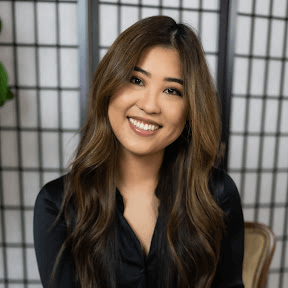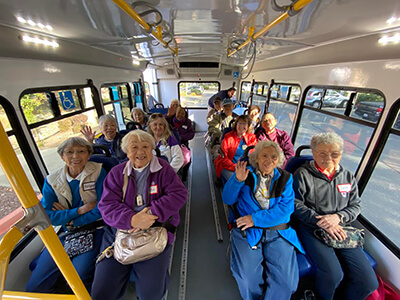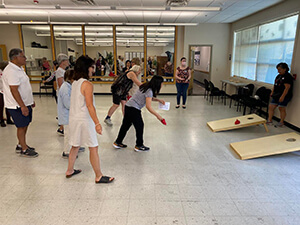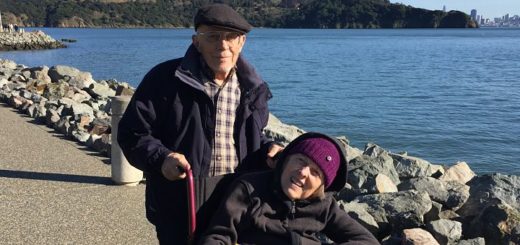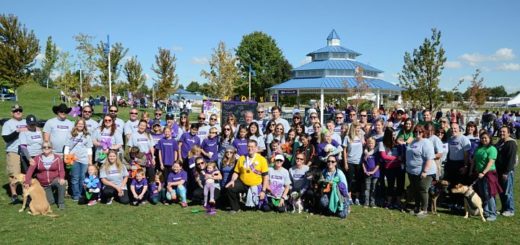Empowering diversity: Bridging gaps in dementia care and cultivating collaboration
By Kerry Larkey, MSN, RN
Each May, the Alzheimer’s Association® joins the community in celebrating Asian American and Pacific Islander (AAPI) Heritage Month. Through strong partnerships with local organizations like the ACC Senior Services, the Alzheimer’s Association raises dementia awareness within diverse communities. Dani Lee, program manager at ACC, shares how this collaboration helps her quickly and effectively connect clients to trusted Alzheimer’s disease education and resources while tackling the barriers to diagnosis and treatment that disproportionately affect the AAPI community.
“Working together with other organizations helps the Association reach more people, which is especially needed in the Asian American Pacific Islander community” said Bonnie Rea, a family care specialist for the Alzheimer’s Association. “More than half of Asian Americans believe that memory loss is a normal part of aging and it’s not. By partnering with community organizations like ACC Senior Services we’re able to educate the community, provide resources and hopefully remove some of the stigma surrounding the disease.”
Serving the community
Dani Lee, Lifelong Learning & Wellness program manager at ACC Senior Services, is passionate about serving the needs of each older adult and family caregiver who walks through the doors looking for support. She is the driving force behind the center’s enrichment activities, helping older adults in Sacramento sustain their independence and lifestyle through educational events, classes, and clubs.
ACC Senior Services, which stands for A Community of Caring, serves older people and caregivers of all backgrounds and abilities. Although it was originally founded to bridge gaps in the availability of culturally sensitive services for older adults within the AAPI community, Dani wants people to know that the community center is open to all members of the public.
Personal connections to dementia
Dani has observed first-hand, the unique ways dementia-related illnesses impact her AAPI clients. Although Asian Americans are less likely to develop Alzheimer’s than other racial groups, they face more challenges accessing care and receiving a diagnosis. According to the Alzheimer’s Association, nearly 88% of Asian Americans report facing barriers to receiving “excellent” dementia care.
Dani’s passion of advocating for people living with dementia extends beyond the clients she serves. As a part of the AAPI community herself, Dani understands how daunting it can be to have difficult conversations about any disease, but dementia in particular. “I think that there is definitely a stigma that people don’t want to know that there’s anything wrong with you,” Dani says. “If you say you have dementia or are depressed, they might think you’re crazy.”
When Dani was younger her “auntie” began showing signs of a dementia. Dani wishes she’d been in a better position during those early stages of her auntie’s illness to help her receive a diagnosis and resources to improve her quality of life.
Stigma and other barriers facing the AAPI community
Like Dani’s auntie, members of the AAPI community are often reluctant to report their symptoms, including to medical professionals, making early diagnosis and treatment difficult. The Alzheimer’s Association reports over half of Asian Americans believe that significant memory loss is a normal part of aging and as a result, the 10 Early Signs and Symptoms of dementia may go unnoticed until the disease is in its late stages. Language barriers can further limit access to healthcare services.
Similar trends impact the older adults Dani works with at ACC. Many AAPI families live in multi-generational households, and it’s common for older adults to move in with their adult children as they age. Dani explains that this arrangement makes older adults less likely to talk to their families about medical problems, including memory issues. They fear feeling like a burden to the family.
Dani notices other contradictions within the AAPI community. “They are more willing to take care of others, to take care of children and parents, but then taking care of themselves is very difficult,” Dani explains. “They’re so good at taking care of others, but not themselves.” Clients of ACC hesitate to reach out for help, fearing that once they say they have a dementia diagnosis, they will be seen differently and treated like a patient.
Creating solutions through collaboration, education, and trust
To bridge these gaps, Dani saw a need for additional support for AAPI caregivers and people living with dementia. Partnering with the Alzheimer’s Association was a natural fit to raise awareness, promote early detection, and empower people to seek help and support.
To address these culturally specific needs, ACC Senior Services and the Alzheimer’s Association collaborated to offer the community quarterly education events at ACC. “The Alzheimer’s Association is so widely recognized,” Dani explains. “When you have a trusted organization presenting information about dementia, there is more trust in it, and people appreciate having expert knowledge.”
In 2022, Dani and Bonnie developed Memory Connections, a social engagement program for individuals living with early stages of dementia or Mild Cognitive Impairment (MCI).
Strong relationships increase access to dementia resources
Since she began hosting these mutual events, Dani has noticed an overlap in the clients who utilize the different services provided by both non-profits. “They love to see us work together,” Dani says, and clients benefit from the warm handoffs from referrals made between the organizations. “We like to have that face-to-face connection, so if I ask [the Alzheimer’s Association] for help, I’m not giving [clients] false hope. I know that [the Association is] going to call them back.”
Building strong relationships, between individuals and organizations, is essential for connecting clients with the appropriate resources when they need them. “To make that as easy as possible and as welcoming as possible has been so fulfilling to me,” Dani says. Isolation is a barrier for many older people in the community and the programs Dani manages help bring people together.
Supporting independence and breaking stigma
Community connections also play a role in combating social stigma around dementia. “Having educational presentations with the Alzheimer’s Association gives people the opportunity to learn more without having to announce [their diagnosis] to everyone, and they can still use services on their own.” Education empowers older adults to choose how and when they access help while maintaining their independence.
Dani also encourages clients to bring their families, caregivers, and children to educational events. “We love closing intergenerational gaps whenever possible.” Spreading Alzheimer’s awareness within the larger community promotes early detection and helps fight dementia-related stigmas.
Thriving with trusted partnerships
The ACC offers a variety of services and programs to provide support and assistance to older adults. By partnering with the Alzheimer’s Association to offer dementia-specific resources and education, Dani is empowering her clients and their families to overcome the challenges facing the AAPI community.
“I’m grateful that there’s an organization like Alzheimer’s Association providing education and presenters for free,” Dani closes. “That’s how we keep our program running. Without the Alzheimer’s Association, I don’t know where we’d look for that kind of information. Having staff who are dedicated and trustworthy makes such a difference. We appreciate the partnership we have.”
Asian American and Pacific Islander Heritage Month is a special opportunity to highlight how vital education, awareness, and access to resources are to addressing Alzheimer’s challenges within diverse communities. The Alzheimer’s Association is committed to battling health disparities and providing support to Asian Americans and Pacific Islanders living with dementia all year round. For more information on resources for the AAPI community, please visit alz.org/asianamericans.
For more information on upcoming education opportunities through the Alzheimer’s Association visit alz.org/communityresourcefinder
For more information on ACC Senior Services visit their website at accsv.org.





